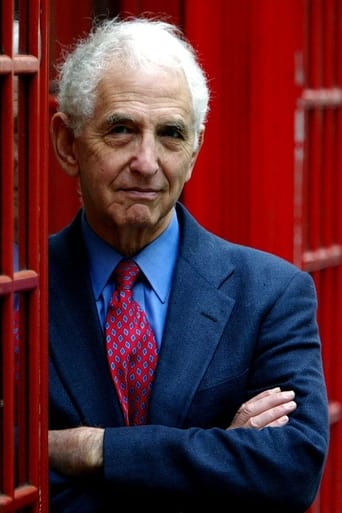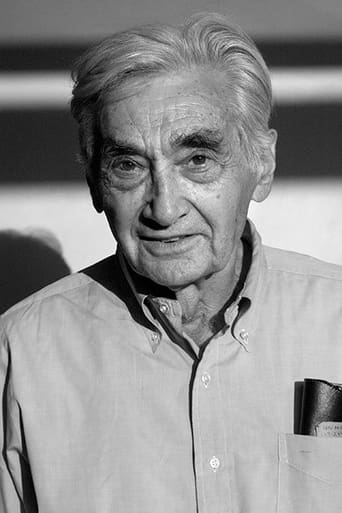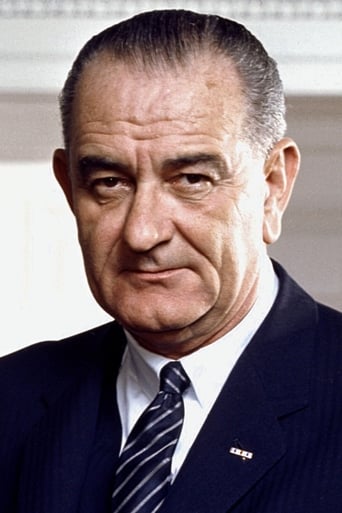Jeanskynebu
the audience applauded
Lollivan
It's the kind of movie you'll want to see a second time with someone who hasn't seen it yet, to remember what it was like to watch it for the first time.
Usamah Harvey
The film's masterful storytelling did its job. The message was clear. No need to overdo.
Kayden
This is a dark and sometimes deeply uncomfortable drama
MartinHafer
Daniel Ellsberg was a very, very important figure during the 60s and 70s and today most people 50 and younger probably have no idea who he is. This is a shame, as his story is fascinating and well worth hearing.The documentary begins in the mid-1960s. Ellsberg is a big name in the Pentagon. He'd served in Vietnam and was rather hawkish about the war. However, as he gained more and more power, he came into contact with more and more super-secret documents and what he read disturbed him. There in black & white he could see some evil facts. First, that the Gulf of Tonkin attack that justified President Johnson escalating the Vietnam War was a hoax! Yes, Johnson KNOWINGLY expanded the war and brought in US combat troops after the American public was informed American ships were attacked--but there was no attack! Second, that Pentagon and State Department documents showed that they KNEW the war was unwinnable--yet they were pushing to expand it and throw young folks into this mess! As a result, Ellsberg went from begin pro to anti-war. In fact, he began to speak out publicly. But, this wasn't enough--Ellsberg decided that he need to release these documents regardless of whether or not this would result in him being sent to prison. How all this later led to the downfall of the Nixon White House, you'll need to see for yourself.Overall, this is an excellent documentary. It uses contemporary film footage and modern interviews to tell the story of a man who felt compelled to violate his oath of loyalty to the President. See this--it's fascinating from start to finish.
Reverend58
The documentary is about a man with a conscience and a love for his country. He experiences an epiphany and realizes the government(s) of his country have been lying to its people for years, specifically about the Vietnam war, and decides to take steps to end the war and bring to light the artifice behind the government's public facade. He sees the costs incurred, in terms of dollars and lives spent, he experiences the hawkish behaviour driving the war in Southeast Asia and in the end puts his career and life on the line to see the truth brought to life.Terrific movie, the qualities embodied by Ellsberg should be encouraged in anyone seeking public office. Those who call him a traitor perhaps should not be so quick to judge this man. Would anyone be happy to see a son come home in a flag draped box because a lying politician sent him to war? Ellsberg thought not, and became an enormous figure in US history because he dared speak out.
paul2001sw-1
Daniel Ellsberg was an ex-marine and top policy wonk, who became convinced that the Vietnam War was wrong. He was also convinced that the government knew it was wrong, but continued to fight mainly to save face. Considering this a moral abhorrence, he leaked top secret papers to the press. They didn't betray really damaging information, but they were an embarrassment to the government who tried to prosecute Ellsberg. To discredit the leaker, President Nixon ordered his aides to burgle his psychiatrist, starting a chain of events that led to Watergate. Eventually, after Nixon had resigned, the war finally ended, although Ellsberg was disappointed that his publication of the truth has failed to turn public opinion decisively against it at an earlier time. It's a fascinating story, and this documentary re-lives it. Most compelling is the sense that Ellsberg gives of a man motivated by an extraordinarily strong inner moral compass; while the likes of Nixon would do anything to hold onto what they had, Ellsberg risked a life in prison in the hope of ending the war. Today, our politicians seem to some to be making the same mistakes their forebears did; we have also learned something of how they lie to us, but still have not stopped them. Ellsberg is still trying. He emerges from this film as a giant of a man.
MisterWhiplash
In the movie The Most Dangerous Man in America, we see what distinguishes very clearly a man like Daniel Ellsberg from a man like Richard Nixon. Ellsberg, when first presented with the position by the President, Lyndon Johnson, that America had to go into war in Vietnam (and a long-term one of course, despite what Johnson said to the media) he knew it was a lie but one he had to work in. He even got into the swing of things early on to give the first report of a heinous act done on an American soldier to McNamara, which was "just what he wanted to see". But it wasn't long after that, while still being a 'hawk' for the side of the Pentagon and the Rand corporation, that he gripped with what he knew from the start: what he was doing was wrong, and he was helping perpetuate a wrong going back to Truman through Nixon. There's a revelation that comes to Ellsberg, and it's there in the film as well - in order to do the right thing, sometimes, one may have to be prepared (and practically be happy) to go got prison for a just cause.Nixon, of course, never felt this way about his ties to the Vietnam war, and if anything, as heard in those oh-so cheerful tapes recorded with him and Kissinger, he wanted to go all out and bomb the "SOB's" into oblivion, to "think big" as it were. He didn't have a conscience about it, plain and simple, and it's this that we see makes out the hero/villain in this story in the film. Ellsberg was a key whistleblower of the 20th century, this despite the media latching more onto the persona of Ellsberg as opposed to the full-blown-holy-s*** content of the Pentagon Papers themselves. Nixon saw Ellsberg as a key threat - not ironically perhaps the reason why his administration tumbled down, this almost in spite of his landslide victory in 1972. I had almost forgotten until the film reminded me of a startling fact: the Watergate break-in was not just for the purposes of helping to sway the election, but to find any dirt at all in Ellsberg's psychiatrist's folders. That's just... mean.Then again, Nixon doesn't become the antagonist in the film until after the halfway point. For the filmmakers, their documentary is poised on Dr. Ellsberg, a very intelligent man who rose up the ranks to become a key player in the Rand Corporation (a place for "free thinkers" to come up with "big ideas" as a think tank), and then into the Pentagon. But we also see how his level of trust and intuition with authority came into large question in his youth, when his father, whom he always trusted as an authority, was behind the wheel in a horrible accident that killed his mother and sister. We don't see how this tragedy of losing those closest to him changed him, per-say (I wondered for a while after the movie ended why this was, until later), but it does serve to show how his bond with his father was broken, how that coupled with the atom bomb drops a year before this left him disillusioned.And if anything is the focus of this movie, aside of course from its protagonist, its about the way in which a person, in a society such as America's in the late 60s and wasn't 100% corrupted, could make a difference when nudged just a little. What not only Ellsberg but the New York Times and the press did gives us lessons today: sometimes a person who knows right and wrong, and knows the consequences both professional and personal (we see the latter especially in Ellsberg's friendship with his boss, the President of Rand, and a colleague who refused to testify at a grand jury trial), has to stand up and do something to break the mold. It's a stirring documentary, informative and full of sobering moments, seeming longer (in a good way) than 90 minutes. The only downside being a few cheesy 're-enactment' flash-animated scenes of some of the nefarious acts being done like photocopying and meetings at night.



